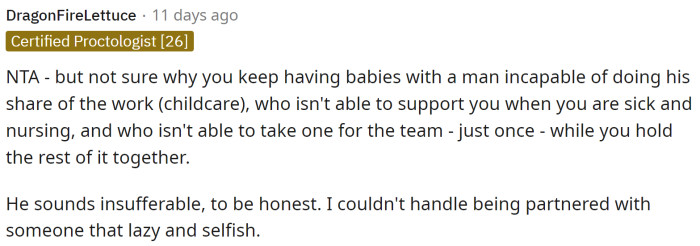Wife Asks Husband to Pick Up Dog Poop While She Wasn't Feeling Well, but Her Husband Refused to Help Her Out
We're back again with another Reddit post from the AITA thread, and this time it's about a woman who asks her husband to pick up her dog's poop. Now, this might not seem like a big deal, but after reading all of the details of this situation, we definitely think that there's a little bit more to the story.
As we've said before, these stories are usually posted on this thread because the poster is looking for an unbiased opinion on the situation. It's a great way to get advice on a situation that is occurring in someone's life and to see if they're wrong or right for how they acted in that situation.
Today's situation involves a couple who seems to be having some problems after a woman wanted her husband to help her out by cleaning up after the dog, but he didn't seem too fond of the idea. After reading the whole situation and seeing some of the comments, there might be more to the story, though.
If you're interested in hearing the full story and seeing some of the comments on the post, then you'll want to stay tuned as we dive into this AITA post and see what people had to say.
OP Starts Off the Post by Explaining Her and Her Husband's Ages and What Animals They Have in the House.

She Explains Her Situation, How She Wasn't Feeling Well, and Had Just Come Back from an Urgent Care Appointment.

She Said That She Came in to Find That Her Dog Had Used the Bathroom on the Floor, but That She Had Some Other Things She Needed to Do.

The Dynamics of Requesting Help
Research on interpersonal communication highlights that the way we ask for help can significantly influence the response we receive. A study by Dr. Robert Cialdini at Arizona State University found that framing requests in a way that emphasizes mutual benefit increases compliance rates.
This suggests that the wife's approach to asking her husband for help might play a role in his refusal. Being explicit about the emotional weight of her request may foster empathy and increase his willingness to assist.
The Importance of Reciprocity
Reciprocity in relationships is essential for maintaining balance and satisfaction. Studies show that when partners perceive their contributions as valued and reciprocated, they experience greater relationship satisfaction and lower conflict levels.
Dr. Laura Stafford from the University of Kentucky found that feeling undervalued can lead to withdrawal or resistance in relationships. Encouraging the husband to reflect on past instances where he has received support may enhance his awareness of the importance of reciprocating help. This could promote a more cooperative dynamic moving forward.
Understanding Requests for Help in Relationships
Dr. Nathaniel Green, a relationship psychologist, points out that the refusal to help with simple tasks can indicate deeper issues in a relationship.
His research suggests that when one partner consistently declines to assist, it may reflect feelings of resentment or a desire for autonomy.
Such dynamics can create a rift between partners, leading to feelings of neglect and frustration.
She Asked Her Husband for Help, but His Solution Isn't at All What She Was Asking For.

However, Her Husband Refused to Help Her, and So She Just Made It Work with What She Had.

She Wants to Know if She's Wrong for Asking Him to Help, Even Though He Said He Wouldn't Be Cleaning Up After the Dogs.

Social psychologists emphasize the role of perceived fairness in relationships, particularly in domestic settings. According to a study published in the Journal of Personality and Social Psychology, individuals are more likely to comply with requests when they feel there’s an equitable distribution of responsibilities.
If the husband believes the chore distribution is already imbalanced, this could lead to resistance to additional requests. Open dialogue about shared responsibilities can mitigate feelings of resentment and promote collaborative problem-solving.
Studies in the Journal of Marriage and Family show that partners who feel unsupported often report lower relationship satisfaction.
When requests for help are met with resistance, it can lead to a cycle of disengagement and disconnection.
She Made an Edit to Share Some Information About How Much She Loves Her Dogs and Is with Them All Day.

People Really Came for Her Husband Quickly and Let Her Know That He's the Problem, Not Her.

Her Husband Is Definitely the AH, and at the Least, He Could've Helped with the Kids Instead of the Dogs If That Was Really the Issue.

Understanding Emotional Labor
Emotional labor, a term coined by sociologist Arlie Hochschild, refers to the process of managing feelings and expressions to fulfill the emotional requirements of a job, including domestic roles. Research indicates that women often bear a heavier burden of emotional labor in relationships, leading to frustration when their needs aren't met.
In this scenario, the wife's request may represent not just a chore, but an emotional need for support. Recognizing and addressing emotional labor can foster healthier communication and collaboration in partnerships.
The Role of Mutual Support in Relationships
Research from the University of California emphasizes that mutual support is a cornerstone of healthy relationships.
When partners actively help each other, it fosters a sense of teamwork and strengthens emotional bonds.
Conversely, a lack of support can create feelings of isolation and resentment.
Ultimately, the Issue Lies Within the Husband, and Pretty Much Everyone Seems to Agree on This.

This Person Had a Lot to Say About Her Husband, but Ultimately the Vote Was That She's NTA.

This Comment Suggested That Maybe It's Just Too Much for Them All Together, but Really She Just Needs Her Husband to Step Up.

Conflict resolution strategies are crucial in addressing disagreements effectively. According to research conducted by Dr. John Gottman, effective communication styles, such as expressing needs without blame, can significantly improve relationship satisfaction.
In this case, the wife might benefit from using 'I' statements to express her feelings and needs, which could help her husband understand the emotional context of her request. This approach may lead to a more productive conversation and a greater willingness to help in the future.
To improve the situation, couples are encouraged to discuss their needs openly and create a plan for sharing responsibilities.
Using collaborative tools like shared calendars can help ensure that both partners feel accountable and supported.
Additionally, practicing gratitude for each other's contributions can enhance feelings of appreciation and connectedness.
This Comment Says That Everyone Sucks, and We Have to Somewhat Agree with This as Well. Boundaries Need to Be Set.

This situation definitely sucks no matter what, but people had a lot to say about her husband and basically said that she should set some boundaries with him. We have to agree that the husband does seem to be a significant part of the problem and that she should have him do more.
What do you think about this, and do you agree?
Psychological Analysis
This situation illustrates how simple requests for help can become sources of conflict when unmet.
It's vital for partners to communicate their needs and expectations clearly to foster a supportive environment.
Analysis generated by AI
Analysis & Alternative Approaches
In conclusion, navigating requests for help in relationships requires open communication and mutual understanding.
Research supports the idea that fostering a culture of support can significantly enhance relationship satisfaction.
Ultimately, prioritizing each other's needs can create a more harmonious and fulfilling partnership.
Understanding the psychological underpinnings of interpersonal communication and emotional labor can illuminate the complexities of requesting help in relationships. As noted by researchers in social psychology, fostering open communication and a sense of fairness significantly contributes to relationship satisfaction.
By addressing emotional needs and encouraging reciprocity, couples can cultivate a more supportive environment. This can lead to healthier dynamics where both partners feel heard and respected, ultimately enhancing the quality of their relationship.



